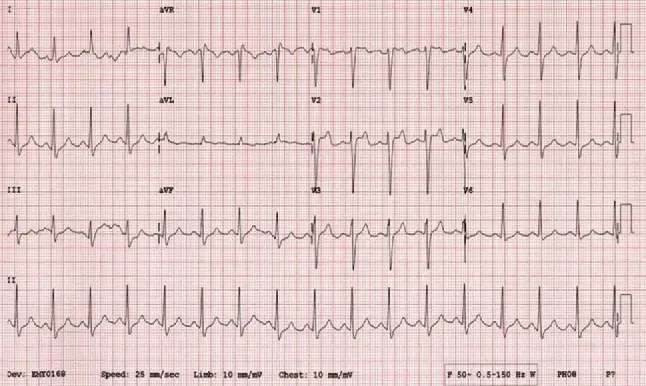Table of Contents
Beyond Pain: Exploring Scorpion Sting Symptoms and ECG Changes in Scorpion Sting
Scorpion stings, though relatively uncommon, can cause a range of clinical symptoms and even lead to ECG changes in affected individuals. In this educational article, we’ll look at what a scorpion sting is, the clinical symptoms that can occur, and the ECG Changes in Scorpion Sting as a result of such stings. Let us dispel the myths and realities about scorpion stings, their symptoms, and their potential effects on the ECG.
A scorpion sting is caused by the puncture of the skin by a scorpion’s stinger, which injects venom. Scorpion stings are prevalent in tropical and subtropical areas, and depending on the species of scorpion and the amount of venom delivered, they can be dangerous or even lethal.
Scorpion Sting Clinical Symptoms
The clinical symptoms of a scorpion sting might differ based on the species of scorpion, the amount of venom injected, and the individual’s response to the poison. Typical symptoms include:
- Pain and Swelling: The sting location is frequently painful and swollen, with regional redness.
- Numbness and Tingling: Some people may have numbness and tingling around the sting location, which may spread to other parts of their body.
- Muscle Twitching: Muscle twitching and spasms, particularly in the limbs, may occur in more severe cases.
- Sweating and Rapid Heartbeat: Sweating, rapid heartbeat, and agitation are all possible reactions to the venom.
ECG Changes in Scorpion Sting:
The ability of scorpion stings to cause electrocardiogram (ECG) changes is an intriguing feature. Toxins found in scorpion venom have been shown in studies to alter the electrical activity of the heart, resulting in ECG abnormalities. These modifications may include:
- Scorpion stings have been linked to ST segment elevation, a key signal of cardiac damage on an ECG.
- Arrhythmias: The venom’s effect on the heart’s electrical conduction system can cause arrhythmias, or abnormal heartbeats, which can be fatal if not treated swiftly.
- QT Interval Prolongation: The actions of scorpion venom on ion channels can cause the QT interval, which reflects the duration between ventricular depolarization and repolarization, to be prolonged.

Here is some more information regarding scorpion stings:
- There are about 2,000 species of scorpions, but only a few are deemed medically significant.
- The most hazardous scorpions live in tropical and subtropical areas, including Africa, Asia, and South America.
- Scorpion stings are more common in rural settings, where humans are more likely to come into contact with scorpions.
- Although there is no specific antidote for scorpion bites, therapy is typically supportive, including pain medication, water, and monitoring for consequences.
- Most scorpion sting victims heal without any long-term complications. Some patients, however, may sustain chronic damage to their heart, lungs, or brain systems.
What to do first after a scorpion sting
If a scorpion stings you, you must immediately:
- If possible, remove the stinger.
- Soap and water should be used to clean the sting site.
- Apply a cold compress to the site of the sting.
- Seek medical assistance right away.
- It is also worth noting that some scorpion species can administer numerous stings.
- If a scorpion has stung you, you should look for signs of envenomation, such as the symptoms listed above. If you encounter any of these symptoms, you should seek medical assistance immediately.
Conclusion
Scorpion stings are more than simply a terrible experience; they can also cause a variety of clinical symptoms and, in some circumstances, ECG abnormalities. Being aware of the potential effects of scorpion venom is critical for recognizing and responding to these circumstances as soon as possible. Seek medical help right away if a scorpion has stung you or someone you know. We may confidently navigate the interesting world of scorpion stings if we remain cautious and aware.
FAQs
Q: Are scorpion stings fatal?
A: Yes, scorpion stings can be fatal, especially if severe allergic reactions occur or if they are not treated swiftly. If you suspect a scorpion sting, get medical assistance immediately.
Q: How can I tell the difference between a minor and severe scorpion sting reaction?
A: Mild responses are characterized by localized discomfort, swelling, and redness. Muscle twitching, trouble breathing, and ECG abnormalities are examples of severe reactions. If in doubt, seek medical attention.
Q: Are all scorpions equally dangerous?
A: No, the potency of scorpion venom varies depending on the species. Some scorpions contain more venom than others, resulting in more severe symptoms.
Q: Can scorpion sting ECG alterations resolve on their own?
A: In certain circumstances, ECG abnormalities may resolve when the venom’s effects wear off. Medical surveillance, on the other hand, is required to guarantee prompt action if issues emerge.
Q: What is the treatment for scorpion stings?
A: Pain management, antivenom injection, and supportive care may be included in treatment. Severe instances, particularly those with ECG abnormalities, necessitate hospitalization and expert care.
Q: Is it feasible to protect yourself from scorpion stings?
A: Wearing protective clothing and shoes, shaking out bedding and clothes, and avoiding areas where scorpions are usually found can all help to lessen the risk of being stung.
Also Read: How to Prepare for ECG
